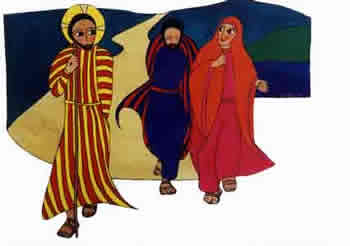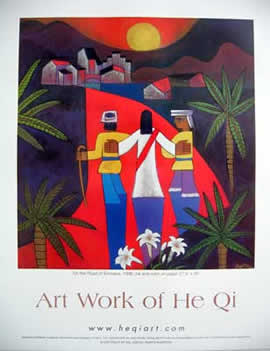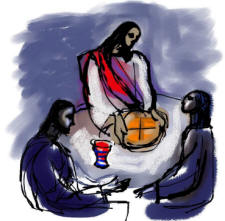The Road to Emmaus:
"What Happened on the Way"
For Sunday May 8, 2011
Lectionary Readings (Revised Common Lectionary, Year A)
Acts 2:14a, 36–41
Psalm 116:1–4, 12–19
1 Peter 1:17–23
Luke 24:13–35
In his book The Mind's Eye (2010), Oliver Sacks explores how the plasticity of the human brain compensates for different types of blindness. As in previous books like Musicophilia, Sacks weaves together clinical anecdotes from his practice as a neurologist, letters he's received, scientific studies, memoirs by blind people, and the results of brain imaging techniques. His longest chapter includes entries from his personal journal about his own experience of ocular melanoma.
Sacks explains how people can be blind in different ways and for different reasons, from birth defect, accident, injury, or disease. Lilian developed "visual agnosia" late in life. She could recognize the tiniest letters on an eye doctor's chart, but couldn't read words or music, even though she was a famous pianist. People with "object agnosia" can't recognize common objects like their own car, even though their visual acuity is normal. Sacks himself has "prosopognosia," the inability to recognize faces. People with "deep blindness" lose even their interior mental images.
 |
The Road to Emmaus by Gisele Bauche. |
The two disciples on the road to Emmaus suffered from blindness. They talked about Jesus, recalling who he was and what he had done the preceding three years. They even talked to Jesus, who walked with them for seven miles from Jerusalem to Emmaus. Nonetheless, "their eyes were prevented from recognizing him" (Luke 24:16, NASB). They thought that Jesus was a political liberator (24:21), clueless that in him God had "reconciled to himself all things, whether things on earth or things in heaven, all things visible or invisible, whether thrones or powers or rulers or authorities" (Colossians 1:16–20).
The story is a disturbing reminder of how we remain oblivious to God's presence even when he's right beside us. Jesus rebuked the two travelers as "foolish and slow of heart" (24:25). And so in church on Sundays we rightly confess our sins and blindness — from human weakness, ignorance, laziness, and especially "my own deliberate fault."
The Emmaus disciples were blinded by their mistaken expectations about what God was doing in Jesus. The relentless and powerful lies of culture blind us to God's presence. Our family of origin shapes us in ways known and unknown, both good and bad. Geography shapes us by the power of place, and church by appeals to divine authority.
For many years I was blind to an empirical truth that's as obvious as the nose on my face, namely, that there are millions of gay Christians who confess Jesus as Lord, love God's people, and serve his church. The gay teenage son of my pastor taught me this many years ago; I'm just sorry it took so long to learn the lesson. Later, the transgendering teenager of other church friends further opened my eyes. Finally, one Sunday in church while I was taking the eucharist, I experienced an acute sense of several gay people near me who were making our ancient Christian confession: "Jesus is Lord."
 |
The Road to Emmaus by He Qi. |
In that eucharistic moment, in that act of celebrating the Lord's Supper with gay believers, my eyes were opened. Who was I to judge the conscience of a fellow human being? How could I doubt the authenticity or integrity of another person's confession of faith? My mind kept returning to the spiritual counsel of the fourth century desert father Moses: "Never judge your neighbor at all, in any way whatever."
The Emmaus story is a eucharist story. Luke 24:30 says that Jesus "took bread, gave thanks, broke it, and began to give it to them." These words are identical to all three accounts of the Last Supper (Matthew 26:26 = Mark 14:23 = Luke 22:19). It was precisely when Jesus "broke the bread" that "their eyes were opened" (24:31), a detail that Luke repeats a second time: "Then the two told [the other disciples] what had happened on the way, and how Jesus was recognized by him when he broke the bread" (24:35 ).
In her memoir Take this Bread (2007), Sara Miles describes herself as a blue-state, secular intellectual, a lesbian, and a left-wing journalist who had developed habits of deep scepticism from covering revolutionary movements in Central America. Her parents were actively hostile to religion. But about ten years ago, Miles walked into Saint Gregory Episcopal Church in San Francisco, partook of the eucharist, and experienced a radical conversion. Before then she had never heard a gospel reading, never said the Lord's Prayer, and knew only one person who went to church. Today she is on staff at Saint Gregory, and author of a follow-up memoir: Jesus Freak; Feeding, Healing, Raising the Dead (2010).
Some of our blind spots are funny and forgivable, but many others are tragic. Not every blindness experiences a cure.
In the documentary film Blind Spot (2002), Traudl Junge describes how when she was twenty-two years old, she was chosen "by complete coincidence and chance" from a typing competition to become Hitler's secretary. Late in life she became deeply disturbed that she had participated in the Nazi horrors at such close quarters and remained so apolitical. In a painful catharsis of self-analysis, she describes her "blind spot" at remaining so oblivious to the obvious. Clearly wanting to unburden herself and to speak publicly for the first time in her life, the movie was taken from ten hours of interviews that Junge gave at the age of 81, just months before she died.
 |
The Road to Emmaus. |
The Greek word eucharisto means "to give thanks." This is what Jesus did in the first last supper: "He took bread, gave thanks, broke it, and began to give it to them." And thanksgiving is precisely what Paul remembers and recommends to us: "When he had given thanks" (1 Cor. 11:23–24).
In the ancient and apostolic act of the eucharist we thank God for his presence in the bread and wine. We thank God for his mighty acts throughout history, for his culminating act in Jesus, and for his ongoing acts in our own lives today. We break the bread for our own brokenness, and thank God for our neighbor who is making the same confession right beside us, for it is my neighbor who can encourage me in my brokenness and help me to identify my blind spots.
Luke ends his story with good news. When the disciples started Sunday morning on their journey to Emmaus, "their eyes were prevented from recognizing Jesus " (24:16). The day ended with a eucharistic dinner when "their eyes were opened and they recognized him" (24:31, 35 ). May it be so for us today.
Image credits: (1) Gisele Bauche: Iconography and Beyond University; (2) HeQiGallery.com; and (3) Wellsprings.org.uk.





